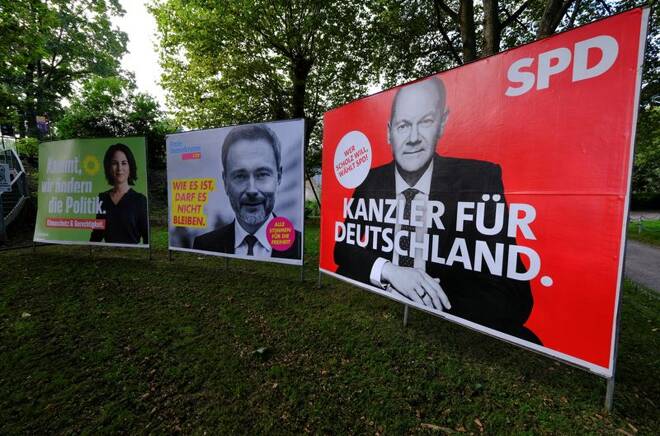Advertisement
Advertisement
Germany’s next government: the likely line-up
By:
BERLIN (Reuters) - Germany's centre-left Social Democrats (SPD), Greens and pro-business Free Democrats (FDP) are set to announce on Wednesday a coalition government to take charge of Europe's biggest economy for the next four years.
(Refiles to add dropped word “FACTBOX” in headline)
BERLIN (Reuters) -Germany’s centre-left Social Democrats (SPD), Greens and pro-business Free Democrats (FDP) announced on Wednesday a coalition deal as they prepare to take charge of Europe’s biggest economy for the next four years.
As top candidate for the SPD, which narrowly came first in September’s election, Olaf Scholz is on track to become chancellor, replacing conservative Angela Merkel.
Here is some background on Germany’s new leader as well as other likely cabinet nominations, according to party sources, although they may not be officially announced for several days.
Chancellor: Olaf Scholz (SPD)
The 63-year old former mayor of the northern port city of Hamburg served as finance minister under the outgoing chancellor, Angela Merkel, as part of the “grand coalition” between his SPD and her conservatives.
He engineered a multi-billion-euro rescue package for the economy during the coronavirus pandemic.
He has said his first foreign trip as chancellor would be to France, a nod to the importance of a functioning Franco-German alliance to reforming the euro zone and strengthening the European Union.
Vice Chancellor and Minister for Economy, Climate Protection, Digital Transformation and Energy Transition: Robert Habeck (Greens)
The ecologist party’s co-leader, 52, is expected to head a beefed-up ministry that has overseen both the distribution of financial lifelines to businesses affected by lockdown and implementing a strategy to develop large-scale green hydrogen. In future, it will also have responsibility for the climate issues that are the Greens’ raison d’etre.
Finance: Christian Lindner (FDP)
The 42-year old leader of the libertarian FDP is widely expected to become finance minister. He has said he will keep in place strict limits on new public borrowing and not raise taxes to finance ambitious investments to wean the economy off fossil fuels and upgrade Germany’s infrastructure for the digital age.
His championing of austerity and strict budget rules in the euro zone could set him on a collision course with counterparts in southern EU states such as Italy and Spain.
Foreign Affairs: Annalena Baerbock (Greens)
Baerbock, 40, is expected to become Germany’s first female foreign minister. The Greens’ co-leader will have to balance her party’s demands for a tougher line on Russia and China on human rights with Scholz’s likely preference not to risk a confrontation with the two countries over issues such as Taiwan and Ukraine.
The remaining ministries have been divided up between the parties but no final decisions on names have been given.
The SPD will control the interior, labour/social affairs, defence, health, building, economic cooperation/development ministries.
The Greens will take family/women, environment/consumer affairs, agriculture ministries.
The FDP will take charge of the justice, transport/digital and education/research ministries.
(Compiled by Berlin newsroom, Editing by Timothy Heritage)
About the Author
Reuterscontributor
Reuters, the news and media division of Thomson Reuters, is the world’s largest international multimedia news provider reaching more than one billion people every day. Reuters provides trusted business, financial, national, and international news to professionals via Thomson Reuters desktops, the world's media organizations, and directly to consumers at Reuters.com and via Reuters TV. Learn more about Thomson Reuters products:
Advertisement
